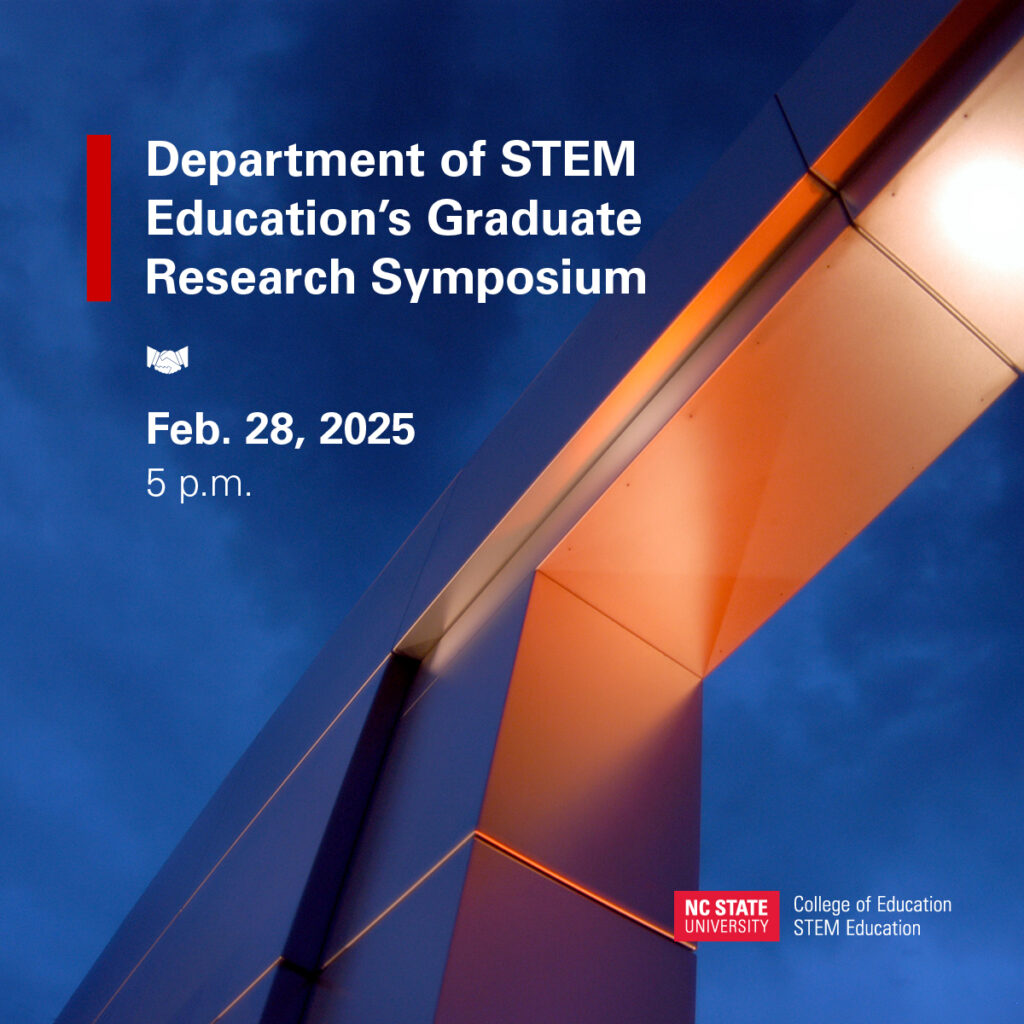The Ph.D. in Learning and Teaching in STEM: Mathematics and Statistics Education concentration develops scholars who address issues related to the theory and practice of K-16 mathematics and/or statistics education. Students develop expertise in cutting-edge technology to bring about digital transformational approaches to learning, teaching, and assessment for a globally connected world.
If you are interested in applying for this program area of study, please use the Apply Now button. *We understand the hardships some students may experience, but we are unable to offer fee waivers
Upcoming Events
Concentration Description
Throughout this concentration, students will use, conduct and evaluate educational research at the highest level. Students may enter with a master’s degree in a variety of fields, such as: Mathematics, Applied Mathematics, Statistics, Mathematics Education, Instructional Technology, Educational Psychology, Elementary Education, or Curriculum and Instruction. Each of these degree programs gives students different strengths and knowledge in content, and teaching and learning issues.
As students engage in professional leadership activities, they will particularly develop:
- A strong foundation in advanced mathematical sciences
- A profound understanding of K-12 school mathematics and statistics
- A theoretical foundation in the learning of mathematics and statistics for a broad range of age groups and diverse populations
- An applied foundation in the teaching of mathematics or statistics to a range of age groups with diverse populations
- The knowledge and ability to lead and contribute to dialogues and debate historical, philosophical, psychological and sociological perspectives in mathematics or statistics education
- An ability to analyze, critique and conduct research related to the teaching and learning of mathematics or statistics
- An ability to apply theoretical knowledge and research results in settings such as: instruction, teacher education, evaluation, supervision, curricula development, technology development and policy-making
Admission Requirements
Please note: If you are currently enrolled in a master’s degree program in our College of Education and are interested in pursuing a Ph.D., you must formally apply to the program through the Graduate School.
- Master’s degree in one of the fields described above.
- GRE test scores (restored for 2023-2024 admission) for applicants applying for all graduate programs in the College of Education.
- Three recommendations from people who know your academic record and potential for graduate study
- Sealed transcripts of all post-secondary education
- Personal essay (1-2 pages) describing your career experiences, future personal goals and how a degree in the desired discipline will affect your career goals. Applicants should indicate how their research interests can benefit from faculty’s research foci. Include a resume (three pages or less) of experience: positions held, internships, volunteer efforts, publications, prior research and skill sets.
Course of Study
All doctoral degrees in the College of Education require a minimum of 72 graduate credit hours beyond the bachelor’s degree. Most doctoral programs in the College of Education require a minimum of 60 graduate credit hours beyond an approved master’s degree.
Curriculum Display for Mathematics and Statistics Education concentration (PDF)
Faculty and Research Projects
Our faculty are nationally and internationally known in the disciplines of mathematics and statistics education. See Current News about our faculty.
| Robin Anderson | Valerie Faulkner |
| Sunghwan Byun | Jessica Hunt |
| Cyndi Edgington | Paola Sztajn |
| Ruby Ellis | Temple Walkowiak |
| Karen Hollebrands | Jonee Wilson |
| Erin Krupa | Gemma Mojica |
| Hollylynne Lee | Jo-Ann Cohen |
Collectively, the faculty have over $15 million in externally funded projects. Many graduate students work on these research teams and often conduct dissertations connected with these projects. A sample of research groups and projects are below:
Hub for Research and Innovation in Statistics Education [ HI-RiSE] at the Friday Institute. Within HI-RiSE there are many active research projects funded by NSF and IES, and online professional learning courses for educators focused on improving the teaching and learning of statistics, probability, and data science in K-12 and early college. Details about each of the projects are on the HI-RiSE website. Director: Hollylynne Lee, Co-Director: Gemma Mojica
Preparing to Teach Mathematics with Technology. PTMT is a long standing project funded by the NSF, with other institutional collaborators, that has contributed research, frameworks, and teacher education curriculum materials for preparing teachers to use mathematics technology tools to support teaching and learning. PIs: Hollylynne Lee, Karen Hollebrands, and faculty at UNC-C, MTSU, and ECU.
Animated Contrasting Cases in Geometry (AC2inG) – This curricular project has developed animated contrasting cases for middle school geometry content in order to help develop student’s procedural and conceptual knowledge of geometry. The animated materials can be found at acinggeometry.org PI: Erin Krupa, Co-PI: Jon Star (Harvard)
Design and Pitch Challenges in STEM – The research team built a set of project-based, innovation challenges aligned to grades 6-8 mathematics content. Each challenge places students in the role of STEM entrepreneurs competing in a start-up competition as they research, test, develop, and pitch innovative and entrepreneurial solutions to locally and globally relevant challenges. PI: Erin Krupa (former PI: Jere Confrey) (Just funded, website coming) The Design & Pitch Challenges in STEM team was awarded a second grant to build D&P Challenges for high school mathematics content. PI: Erin Krupa, Co-PI: Robin Anderson.
Validity Evidence for Measurement in Mathematics Education (VM2ED) – The purpose of this project is to fully explore the mathematics education literature to synthesize what validity evidence is available for quantitative assessments in mathematics education. Drawing on the results of the synthesis study, the researchers will design, curate, and disseminate a repository of quantitative assessments used in mathematics education teaching and research. PI: Erin Krupa, Co-PI: Jonathan Bositc (BGSU)
Noyce Master Teacher Fellows Program -Started in 2019, the North Carolina High School Mathematics Master Teacher Fellows Program is preparing a select group of 19 high school mathematics teachers in seven high-needs school districts in North Carolina. Through this five-year program funded by the NSF, we are helping these teachers advance their knowledge in math and math teaching, become a reflective practitioner, and prepare to lead at the school or district level. PI: Karen Hollebrands, Co-PI: Erin Krupa and Molly Fenn
Model Mathematics Education (ModelME) – This three-year project is developing a game integrated curriculum for students with learning disabilities and difficulties in fourth through sixth grade, with the goal of increasing understanding of and engagement in fraction concepts. The game (click here for Beta version) will utilize executive function scaffolds and cognitive tutoring to support students’ unique abilities as they play. PI – Jessica Hunt, Co-PIs- Matthew Marino and Michelle Taub (UCF).
Fraction Activities and Assessment for Conceptual Teaching (FAACT)– This five-year CAREER Award from NSF documented learning trajectories in fractional reasoning for students with learning disabilities. It also developed and tested a curriculum to be utilized in intervention settings to bolster concepts of fractions in 4th, 5th, and 6th grade. The curriculum is available here for free. PI – Jessica Hunt.
Professional Learning Online Modules (PLOM) – This two-year project is funded by the IES and will facilitate the development and study of two new professional online learning modules, including “Teaching Math to Young Children”, which will evidence-based principles and instructional materials to support the mathematical learning of young children. PI Carla Johnson, Co-PIs – Jessica Hunt, Hiller Spires
At-Home Learning Initiative – The At-Home Learning Initiative helped promote remote learning access across the state, specifically for students who lack access to a stable internet connection. With funds from the NC Department of Public Instruction through the CARES Act, the Friday Institute facilitated the creation and implementation of 192 literacy and math lessons for PreK-5 students. All recorded lessons will be available on YouTube for free with accompanying lesson plans and activities on GoOpenNC.
Additional Information
Those interested in more details about the program can see the Handbook
2024 STEM Graduate Student Handbook

